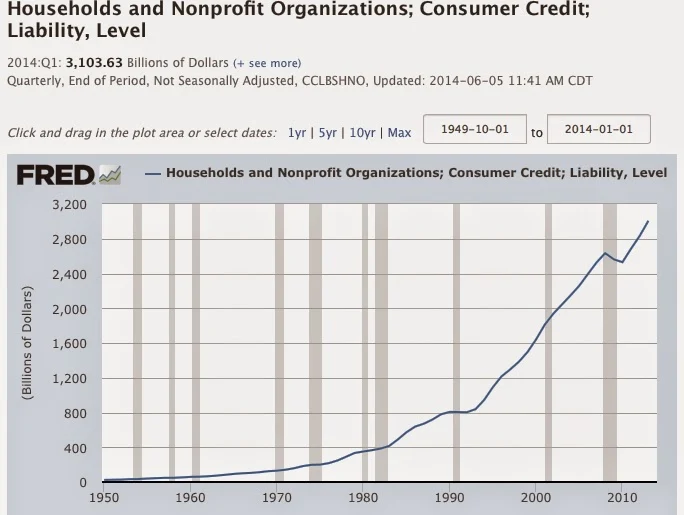Unemployment in June falls to 6.1% and total non farm employment is up 288,000, seasonally adjusted, to finish the second quarter. Not seasonally adjusted, the figure is an impressive sounding 582,000 newly employed.
So Q1 GDP at -2.9% is meaningless, right? We're really doing much much better than that number indicates, yes?
That's what fellow traveler Rex Nutting thinks over at MarketWatch in "The payrolls report is right, and GDP isn't". He goes so far as to say that even 2008 negative GDP was meaningless:
"Take, for instance, the first quarter of 2008, just as the Great Recession began. The first estimate of quarterly GDP was 0.6% growth. In mid-2008, that was revised to 0.9%. A year later, however, GDP was revised to a 0.7% decline. The most recent estimate is that the economy shrank 2.7%. It’s madness to think this number means anything."
Spoken like a true believer in the success rate of Soviet 5-year plans. At least "shrank" shows he's educated.
And even John Silvia of Wells Fargo says the jobs report shows "economic growth is far better than the Q1 GDP report indicates".
Oh really? I don't think so. The employment gains aren't telling us anything indicative of a break out to the upside either for jobs or for the economy. To see this you have to stop comparing apples to oranges by comparing monthly change in jobs to GDP which is measured on a quarterly basis.
When you look at the jobs figures on a quarterly basis, you see that total nonfarm always takes a dive in Q1, good economy or bad economy, and it always rebounds in Q2, good economy or bad economy. It tells you almost nothing about the economic trend that in Q2 you always get an increase. So we should expect the jobs numbers to go up in the spring, and they always do. Go all the way back in the not seasonally adjusted data to 1981 and you will see that this is true, in the awful year 1982 when the gain was a lousy 1.0%, and even in the dreadful year of 2009. When 2009 was over there were nearly 30 million first time claims for unemployment, yet between Q1 and Q2 that year total nonfarm went up 138,000, a paltry 0.1% but still completely counter trend. The worst was over. Not.
In 2014 we have just witnessed total nonfarm go up 2.805 million jobs between the end of Q1 and the end of Q2, the most since Obama has been president. But guess what? That's an increase of barely 2.06%. Obama's actually done better, for example in 2011 when the increase was 2.09%, his best Q1 to Q2 gain on record. But we don't point to that number today as a sign of the economy turning around at that time, especially since the measure has been weaker since, and GDP has actually gone negative since.
It's instructive to compare Obama's recent 2.06% quarter on quarter gain with past presidents' records for the same period from winter to spring.
How high was the best record Q1 to Q2 since 1980, for example? You would be surprised that it's barely 29% higher than Obama's best to date. Reagan, of boom fame, holds top spot at just 2.69% in 1984. Clinton comes in second with 2.56% in 1994. George W. Bush comes in third with 2.14% in 2005. Obama comes in fourth in 2011 at 2.09%. And George Herbert Walker Bush brings up the rear in 1989 at 1.92%.
But the best record isn't a very good predictor of economic growth ranking. Best GDP to worst was Clinton, Reagan, Bush I, Bush II, and then Obama (so far), not Reagan, Clinton, Bush II, Obama, Bush I.
The overall jobs record between Q1 and Q2 seems like a better predictor of likely economic growth ranking. Clinton, first for GDP, averaged 2.22% over eight years while Reagan, second, averaged 2.07% for the increase in total nonfarm between the winter and the spring. In third is George Herbert Walker Bush at 1.69% (third also for GDP), followed closely by Obama at 1.68% (last for GDP so far) and George W. Bush bringing up the rear at 1.3% (fourth for GDP).
It's entirely possible that Obama already peaked for jobs increases from winter to spring in 2011. Each of the other four presidents peaked early or mid-term. It would be unusual for Obama to do better this late in his term. And so far he hasn't, and has just two more opportunities to prove me wrong.
Overall Obama has lost his momentum, his aura and his credibility, and his lately shrill tone sounds more like a dying bunny the cat got in the backyard than a statesman presiding over the final years of a successful term. I think that means it's likely Obama's overall jobs performance is going to remain weak, as will his GDP.




